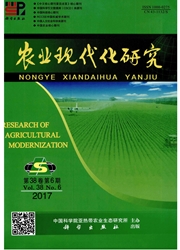

 中文摘要:
中文摘要:
乡村转型发展是当前我国城乡一体化建设和全面建成小康社会的重要内容,乡村转型发展的驱动力和影响因素众多,旅游产业具有关联度高、带动性强和生态环保的特征,通过旅游开发可以有效推动农村产业结构升级、空心村治理、农村剩余人口的就地安置、农民增收和农村空间重构。在乡村转型发展驱动机制研究成果系统回顾和梳理的基础上,对旅游与乡村发展的互动关系进行了探讨,利用压力—状态—响应(PSR)模型分析了旅游驱动乡村转型发展的作用机理,构建了理论分析框架,并结合辽宁盘锦某乡村旅游规划案例的实证分析,提出了创新型乡村度假地产和农业文化遗产旅游二种乡村旅游发展创新模式,识别了旅游驱动乡村转型发展的关键成功因素,包括立足资源禀赋,结合时代需求,注重产业融合,加强城旅联动,重视用地平衡,加强生态环保,开发模式创新,重视公共参与。探索了旅游驱动乡村转型发展模式在东北地区乡村发展和区域发展中的可行性与未来前景,为全国其他类似乡村地区的转型发展提供了参考借鉴。
 英文摘要:
英文摘要:
Rural transformation development is an important issue in China's urbanization. As a highly correlated and comprehensive industry that is related to many sectors of the national economy, tourism is regarded as one of the significant driving force of rural transformation development. Tourism development can effectively promote the rural transformation development in the aspects of upgrading rural industry structure, renovating "hollow village", increasing farmer's income and reconstructing rural space. In this paper, based on a systematic review of existing researches on the driven mechanism of rural transformation development, the interactive relationship between tourism and rural development was discussed. Then the mechanism and theoretical analytical framework for tourism driven rural transformation development was explored by using the PSR (Pressure-State-Response) model which is widely used in the research on the interactive relationship between human society and the geographical environment. At last, an empirical analysis was conducted through a case study of rural tourism planning in Panjin Municipality, Liaoning Province, in order to put forward the viable model for rural tourism development, and identify the critical success factors of tourism-driven rural transformation development, including local based on resource endowments, aligning with modern requirements, paying attention to integration of economic sectors, strengthening interaction between city development and tourism, keeping landuse balance, stressing eco-environment protection, enhancing development innovation and promoting public participation. This paper proposed the feasible and future prospects of the tourism-driven rural transformation development in Northeast China, and provides a reference for other similar rural areas in China.
 同期刊论文项目
同期刊论文项目
 同项目期刊论文
同项目期刊论文
 期刊信息
期刊信息
